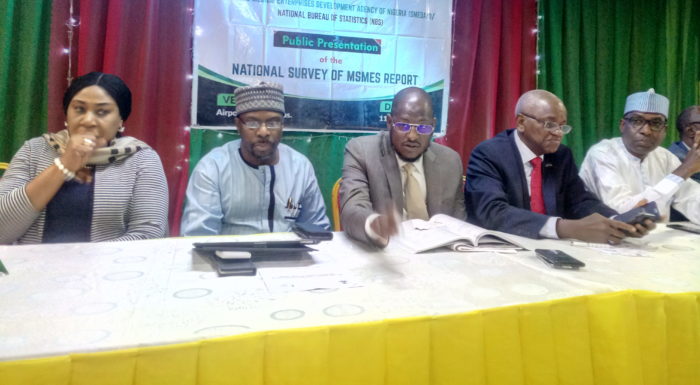
The Statistician-General of the Federation, National Bureau of Statistics (NBS), Dr Yemi Kale said that 41.5 million Micro, Small and Medium Enterprises (MSMEs) were registered in 2017.
Kale made this known during the Public Presentation of the 2017 NBS-SMEDAN Small and Medium Enterprises Development Agency of Nigeria (SMEDAN) and National Survey of Micro, Small and Medium Enterprise (MSMEs), held in Lagos on Thursday.
He said that Lagos State had the highest number of enterprises across all classes,
while Kastina had 36.4 per cent, Rivers 21.7 per cent and Kaduna 18.1 per cent.
“The five major sector of the economy were wholesale/Retail trade representing 42.3 per cent, Agriculture 20.9 per cent, other services 13.1 per cent, Manufacturing 9.0 per cent, and Accommodation and Food Services 5.7 per cent, together these account for about 91.0 per cent of all MSMEs.
“A total of 86.8 males were dominant in agriculture, while 86.8 female dominance was instead observed in accommodation and food services, 68.7 per cent recorded in manufacturing, 64.5 per cent on wholesale/retail trade.
“With regards to ownership status, Sole Partnership predominated at 97.1 per cent followed by partnerships of 2.2 per cent.”
He explained that MSMEs played significant roles as engine of socio-economic
transformation, including industrialisation of many economies globally.
Kale said that MSMEs presented a vital platform for boosting technical, technological and entrepreneurial capacities among critical segments of the populace.
He further said that MSMEs also offered opportunities to drive jobs and wealth creation as well as income re-distribution within the society.
He said that in Nigeria, MSMEs had performed below expectations due to a combination of problems which includes off-mentioned infrastructure deficit and frequent public policy changes and somersaults.
Kale said that there had been serious efforts by both the Federal and State Governments to develop the MSMEs sub-sector.
He said that the efforts included the adoption of the erstwhile National Economic Empowerment and Development Strategy (NEEDS) of a private sector-led economic development approach with MSMEs development as a central strategy in 2003.
In his keynote addres, the Permanent Secretary, Federal Ministry of Industry Trade and Investment, Mr Edet Akpan said “it became public knowledge that
the total number of Micro, Small and Medium Enterprises in the country was
about 18 million. These also employed a total of 32 million persons as at December 2010.”
“On the heels of the national economy re-basing, the number of enterprise
surged at the next edition of the Survey in 2013, with more than 37
million, with complementary employment contribution of 59
million persons.
“Such indices as the contribution of Micro, Small and
Medium Enterprises to GDP exports as well as their distribution across major
economic sectors and sub-national units also emerged, not forgetting
identification of challenges faced by the sub-sector.
“The 3rd edition of the Survey presented today, provides an update on
important indices on the sub-sector. Two chapters have been devoted to
data analyses to optimise the information available and to make it easier to
the reading public to obtain copies.
“You may recall that this was part of the
highlights of the National Survey of MSMEs Report presented by the
Statistician-General, National Bureau of Statistics,” Akpan said.
In his welcome address, Director-General Small and Medium Enterprises Development Agency of Nigeria (SMEDAN), Dr Umaru-Dikko Radda, said since 2010 when the National Serve of MSMEs was first published which had become an invaluable compedium on the state of the MSMEs sub-sector in Nigeria.
Radda said that the strategic partnership between SMEDAN and NBS was an example of the synergies that he had always advocated since he assumed office as director-general of SMEDAN.
“Setting up of SMEDAN in 2003, was Government’s major response to tacking the problem of MSMEs sub-sector of the Nigerian economy, SMEDAN assumed the twin role of coordination and facilitation as the apex agency for MSMEs development among others.




纸飞机下载 是一款注重隐私和安全的消息应用,提供端到端加密聊天等功能。